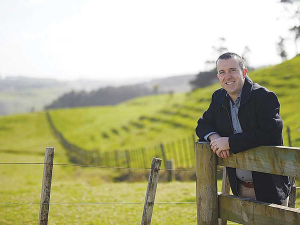Open Country opens butter plant
When American retail giant Cosco came to audit Open Country Dairy’s new butter plant at the Waharoa site and give the green light to supply their American stores, they allowed themselves a week for the exercise.
 As countries gradually get on top of Covid and the global economy rebounds in the coming years, dairy demand will firm up, says Nathan Penny, Westpac.
As countries gradually get on top of Covid and the global economy rebounds in the coming years, dairy demand will firm up, says Nathan Penny, Westpac.
Demand for dairy will firm over the next two years as the global economy rebounds from Covid, says Westpac senior agri economist Nathan Penny.
He notes that the trend has already started in China and East Asia where demand has rebounded from its lows earlier in the year.
Westpac has announced a 2021-22 initial opening forecast of $7/kgMS. The forecast is equal to its forecast for 2020-21 and close to the $7.14/kgMS final price achieved in 2019-20.
“Our forecast is higher than the long-run average milk price, although the difference is smaller when the prices are adjusted for inflation,” says Penny.
A key change that Penny expects is that demand and prices for milk fat will begin to normalise.
Currently, milk fat prices are soft as consumers eat less cream and other milk fat products in settings such as restaurants.
“In particular, we expect that the rollout globally of Covid vaccines will gradually allow more people to return to restaurants and other venues that milk fat consumption relies on,” says Penny.
He expects moderate growth in the key exporting countries over the next two years.
“Over recent years, annual growth has averaged in the vicinity of 1%.
“This relatively modest growth is another reason why prices have held up well during the global Covid recession.
“Moreover, we see a low probability that global supply will deviate materially from these trends by enough to offset the impact on prices from rising demand.”
However, there are a few “forecast risks”, including the New Zealand dollar and the possibility that dairy buyers run down stocks after having built them up during Covid to protect against supply disruptions.
“We note that there is a risk that, if the New Zealand economy’s resilience continues to surprise and local interest rates rise, then the NZD/USD could rise beyond what we have assumed.
“In this event, the milk price would be lower.”
There is also uncertainty around global agricultural trade policy.
Penny says Joe Biden’s US presidency may take a more trade and China-friendly stance, thus allowing the US more access to China’s market and thus more competition for New Zealand dairy exports.
“Finally, we assume normal weather conditions going forward. In the case of a NZ drought, global dairy prices are likely rise.”
The Meat Industry Association of New Zealand (MIA) today announced that Chief Executive Officer Sirma Karapeeva has resigned from the role.
The winners of the 2026 Hawke’s Bay/Wairarapa Dairy Industry Awards were announced at the annual awards dinner held at Copthorne Solway Park in Masterton on Thursday evening.
Environment Southland is welcoming this week’s decision by the Environmental Protection Authority (EPA) to approve the release of Blaptea elguetai, a leaf‑feeding beetle that will help control the highly invasive Chilean flame creeper.
This March, the potato industry is proudly celebrating International Women’s Day on 8 March alongside the International Year of the Woman Farmer, recognising the vital role women play across every part of the sector — from paddocks and packhouses to research, leadership, and innovation.
Fruit trader Seeka posted a record profit and returns to shareholders in 2025.
Recent weather events in the Bay of Plenty, Gisborne/Tairawhiti, and Canterbury have been declared a medium-scale adverse event.
OPINION: Staying with politics, with less than nine months to go before the general elections, there’s confusion in the Labour…
OPINION: Winston Peters' tirade against the free trade deal stitched with India may not be all political posturing by the…